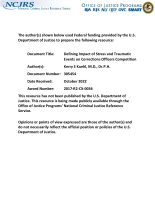Occupational Stress Associated With Technological Diversion Among Pretrial Services Officers: A Qualitative Case Study of GPS Supervision for Intimate Partner and Domestic Violence Cases
Journal
Journal of Contemporary Criminal Justice
Date Published
2023
Agencies
NIJ-Sponsored
Publication Type
Research (Applied/Empirical)




